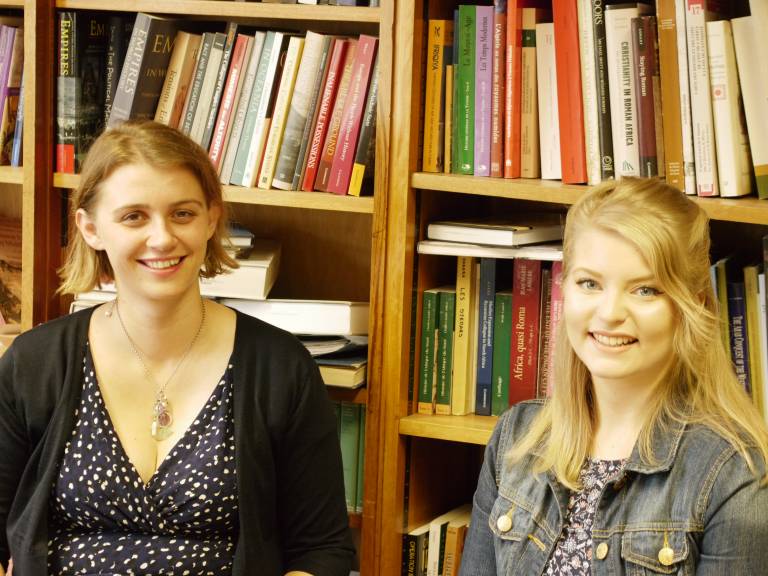Why being a personal tutor is such a rewarding part of my job
Dr Corisande Fenwick is a Lecturer in Mediterranean Archaeology in the UCL Institute of Archaeology and is a personal tutor. She explains what she enjoys about being a personal tutor.

7 November 2017
The Institute is known and recognized within UCL as having a model personal tutoring system, which has been in place for decades. Student support is really important for us as a department and our students recognize that - it’s one reason why we’re voted highly in the National Student Survey (NSS).
Personal tutoring supporting the creation of a community
I like being part of a department where student experience and support is taken so seriously. We all want our students to be the best that they can be and personal tutoring is one of the forms of academic support that helps our students to achieve that.
At UCL, our students are the best of the best – they’re really high achievers but they’re human, and life happens. Particularly once they leave home, move to a big city and university and have to make new groups of friends. They may have to work alongside their studies or have caring responsibilities at home. It can be a tricky time.
Our students are normally happy to tell us how they’re getting on and what they need, which makes it easier for us to support them. Having that atmosphere where students know its ok to ask for help or to say “I don’t know what to do” is really important and is probably the biggest challenge for departments who don’t have a strong personal tutoring system yet.
We all work really hard to create a friendly environment where it’s ok for students to ask for help: to say that they need support in developing their writing skills, understanding feedback or that they need support from, e.g. student disability services, or have a health issue (physical or mental) that will affect their studies. Asking for help is not somehow admitting some kind of weakness.
As personal tutors, we provide support to our own tutees, but we also work together as a department. We have a list of all personal tutors and tutees and if we see a student struggling or showing signs of something not being right, we’ll let their personal tutor know. I’m then confident that their personal tutor will follow up and talk to them about it.
Taking an active role in someone’s development and future
Generally, we look at the big picture in our personal tutoring meetings: what the students are interested in and how their course is going generally. We have a form we work through once a term which helps guide conversations and track progress.
I also ask my tutees to draw up a timetable of their deadlines, which they find it quite useful as they can see if they have a cluster of deadlines coming up well in advance and plan appropriately. We also talk about what courses they might be interested in doing next year, whether there might be something they need to do for their fieldwork, their dissertation and beyond that for their career – volunteering and internship options or learning a foreign language. So it is not just about their time at UCL, but supporting students to think about their goals for the future and how to achieve them.
Personal tutoring also has an effect in the classroom. This year, a couple of my tutees are taking a class I teach and that’s fun for me because I get to see my tutees in classroom situations. It creates a good (and more talkative) atmosphere in class discussions and encourages other students to see staff as approachable – all of that makes us a much more friendly department.
I build close relationships with my tutees and feel very invested in seeing them improve and prosper - I want to know what they’re up to, what their future plans are. It is great to hear another member of staff say “Oh is that your tutee? She did really well in my class” or “I just wanted to let you know that your tutee completed some field work with me this summer and did a fantastic job”. As staff members, giving each other this feedback and support is very rewarding.

Supported by the Institute to help our students
The support the Institute of Archaeology provides makes it easier for me to be an effective personal tutor. We have a framework to work to – the baseline is set at Faculty level, but the Institute of Archaeology has guidelines and forms which we use to provide discipline-specific support for our students. As a probationary lecturer, I have also had some training: I completed the Arena Two course which included sessions on personal tutoring.
We also have an amazing academic administrator, Judy Medrington who’s the go-to person, not only for the students but also the staff. She guides us to the best place to go to for support if a situation arises.
Importantly, our roles as personal tutors are recognised within our workload score, depending how many tutees we have and we balance it between staff so no one is too overloaded. This means that my department makes sure that we do have time to give to our tutees. We all have office hours, but we’re a pretty easy-going department so if it’s an emergency and I’m in, then I’m happy for my students to just burst in (if it’s not an emergency then I prefer to make an appointment but we’re all flexible). I think we’ve all experienced a student bursting into our offices in some sort of crisis!
Perhaps the greatest challenge for our students is access to mental health support. The NHS is stretched and our own student psychological services is over-subscribed. It’s extremely frustrating when it takes a long time for our students to see someone when they need help,, and then that support is time-limited. I hope that UCL will invest even more in providing mental health support and safe spaces for students to talk with professionals.
Personal tutoring is vital for our students’ academic and personal welfare and development. Without a single-point of contact - an anchor - to go to, students can feel lost. It is very rewarding to provide that contact-point as a personal tutor and to watch your tutees flourish during their time at UCL and beyond.
 Close
Close

